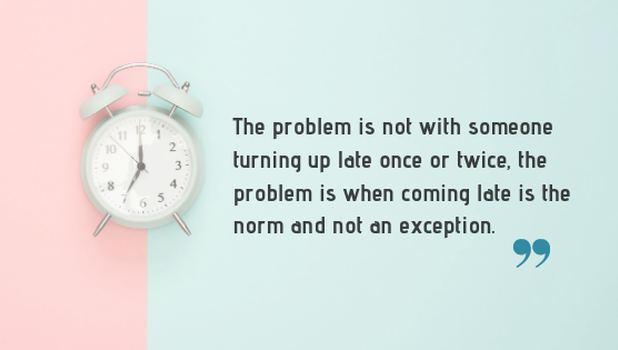5 ways to deal with an employee coming late
by Amrit Hallan posted on 12th April 2019 36 0
Are some of your employees chronically late?
As a growing business, you depend on your employees to run your business operations efficiently. Late employees don't just put a dent in their own productivity, they can also cause a ripple effect, causing a sense of disenchantment and disillusionment among other employees.
Intentionally or unintentionally, the late-coming employee may also be setting a precedent for other employees. If you don't take care of this problem as soon as it manifests, before you know, you will find that it has spread among other employees too.

When to know that coming late to the office is becoming a problem?
Arriving at work occasionally is not a problem. We live in a highly unpredictable world. On a particular day, maybe there was a traffic jam. Maybe someone was sick in your employee's family. Maybe she left her purse at home and she needed to rush back to get it. Maybe the vehicle she was traveling in broke down.
There can be thousands of reasons for an employee to turn up late occasionally and every organization needs to accommodate certain situations. As mentioned above, the problem is not with someone turning up late now and then, the problem is when coming late is the norm and not an exception.
You know you have a problem at hand when the employee is late most of the days and every time you ask for a reason, there is a new reason. Other employees also start to complain that because of the absence of the late employee, certain jobs are not done, and the delay has a cascading effect on the productivity of other employees.

For example, a presentation was to be sent to a customer, based on the edits done by the employee who is always coming late, and since she was late, the presentation couldn't be sent. This is when you know that there is a problem that needs to be taken care of.
How to make sure that your employees turn up on time every day without getting late?
Listed below are 5 ways you can deal with an employee coming late to work:
1. Spell out the policy clearly in the beginning itself:
When a new employee signs the contract, it should be clearly mentioned that coming on time is a serious issue in your organization and it is even a part of employee evaluation. Written word, especially when someone acknowledges it and signs it, is far more effective than verbally telling someone. It also gives you a sure footing in case you need to confront the employee for his or her tardiness.
2. Address the problem before it escalates:
Once or twice coming late in a month isn't a serious problem but if you notice a consistent pattern, have a conversation with your employee. Just have a friendly chat around the water cooler, preferably when no one is around. Let him or her know that punctuality is taken seriously in your office and since every employee is important, his or her presence on time is also important.
3. Try to understand the real problem:
In most of the cases the employee is unhappy about turning up late himself or herself. Ask him or her what's the problem and what can be the solution. Remember that the purpose is not to find faults with someone, but to find a solution to a problem.?

4. Make the person accountable:
Aside from mentioning it in the contract, have a clearly‐defined policy which is regularly communicated to all the employees, about not turning up late. You can also initiate a reward system for all the employees coming on time. Define some consequences for not coming late, for example, including some negative marking in a routine evaluation or reduction in bonus for employees not coming on time.
5. Introduce technology to track employee punctuality:
Technology is the best solution because nobody takes technology personally. Take for instance, Rollcall ‐ which allows you to automatically generate attendance and absenteeism report (among many others) that is trusted by everyone. Since software application through its biometric integration tracks when a person arrives in the office, it provides an automatic incentive to employees who are a bit lax about arriving on time. They know that each time they come late, the entry will be registered on that time and then the data will be entered in the final weekly or monthly report, having an adverse effect on their overall performance.
With a clear policy, plan of action and a handy and robust HR system, you can pave the path for improved employee punctuality and see the rate of absenteeism and late attendance plummet with great speed.
